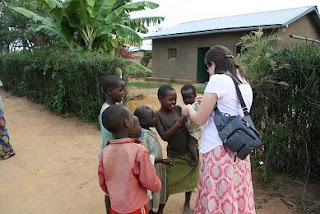We chose to come to Rwanda because I wanted to "experience" the genocide; to be able to tell my students that I've been there, that I've seen the sites, smelled the smells, walked on the grass where evil existed. This journey began at the Kigali Genocide Memorial, a place Ellen explained with more depth and emotion that I could possibly muster.
 |
| Homes in Mayingye |
 |
| Me, Janet, her baby Natasha, and Benon |
I'm fascinated, but generally pretty intellectual about religion; I see its value and, as a history teacher, I've seen the many ways its teachings and implementation can go horribly awry. But I walked away from that tiny house in Mayingye thinking one thing: if "God's work" exists, then this is it.
 |
| Conflict renewed in Rwanda: introducing Silly Bands. |
The feeling was short-lived. Just down the road, we were pulled over by the police, who were manning a routine roadblock (these are all over Rwanda). A large uniformed man with an AK-47 inspected the outside of our car, while another asked us to see our passports. "This is no problem," Benon said as he handed over his passport. Thankfully, I happened to have ours on me that day (and every day since) and I handed them over. The officer smiled at Ellen's distinctly unsmiling terrorist picture, gave me a thumbs up, and handed them back. It all felt incredibly wrong to have just driven away from the embodiment of post-genocide reconciliation and right into a hallmark of a police state. My stomach churned.
We proceeded to a nearby memorial site, Nyamata, which is a converted church. This is typical: one of the more horrifying realities of this genocide is that hundreds of thousands of Tutsis who sought refuge in Catholic churches (something they had successfully done during conflicts in generations past) were then murdered in the churches, often with the assistance of Catholic clergymen. This particular memorial at Nyamata is brutal: there are mass graves outside, much like the ones in Kigali, which house over four hundred thousand remains, but inside are thousands and thousands of pieces of victims' clothing, stacked up on the church pews as a stark reminder of the humanity and individuality of those who died. Even though the memorial was technically closed, a young docent whose entire family was murdered at Nyamata allowed me to walk down the steps into one of the mass graves to see the hundreds of coffins, draped with purple shrouds. Inside these catacombs, there are also simple wooden shelves holding thousands of skulls and bones, many broken or damaged from the murders.
When we came back up, Benon, whose cheerfulness is generally unflappable, began to speak sorrowfully and angrily about how God could allow something like this to happen and how justice had not been done. After what we had been through at Mayingye, it was heartbreaking. We were silent for a while on the ride home.
Ellen and I decided to go to a restaurant called Heaven for dinner-- it is run by some American expats and is pretty much a magnet for white tourists-- we needed to spend some time somewhere that felt a little familiar. The food was pretty good, and the owner, Josh, talked with us for a while about living in Rwanda.
We got out early on Tuesday because Benon was adamant that we visit another memorial site in Murambi. "If you want to understand the genocide, you have to visit Murambi" he pleaded. So we agreed to make the three-hour trek out there. Along for the ride was a college student introduced to both Benon and us by Dr. Pasick named Jean d'Amour. He's studying Biology at the University of Butare, which is on the way to Murambi. His father, a lawyer, was an active resistor during the genocide, but Jean had never been able to speak about that with him until Dr. Pasick interviewed them for Stories for Hope. It's made a tremendous, palpable impact on his life and his relationship with his father. Plus, he's just a sweet kid.
Murambi might be the most difficult genocide memorial there is in Rwanda (or anywhere, for that matter). It used to be a technical school situated on an improperly beautiful hill, which was in the process of being rebuilt when the genocide happened. When it began, Tutsis were encouraged by the government to assemble there so that they would be safe, and then over fifty thousand of them were murdered with grenades, machine guns, and handheld weapons like machetes. Now the old buildings of the school house 848 bodies, on display in 24 rooms, treated with lime to keep them from totally decomposing. Many are still in the positions in which they died: arms up to protect themselves, screaming. There is one room full of the corpses of dozens of babies and children. This is the ultimate evidence that what happened in Rwanda was not a civil war, or an evenly-matched ethnic conflict, but a genocide.
 |
| Mass graves at Murambi |
After Murambi, we had seen enough. Between those sites and our unforgettable experience at Mayingye, my goal has been achieved. Thankfully, the rest of our time here has been and will be spent on happier things. On the ride home, we shared some of our snacks with Benon and Jean. They both accepted a Nuts n Honey snack bar, which they both ate a piece at a time, and described as "very...sweet." We're pretty sure they hated them, but courageously finished them anyway. Everyone in the world, it turns out, likes Goldfish.
I'm drained after reading that. I can only imagine how you felt after actually being there.
ReplyDelete